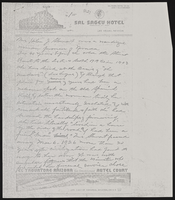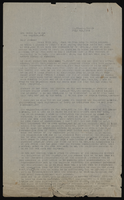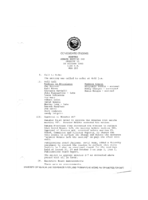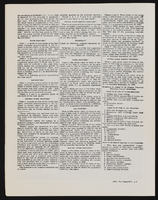Search the Special Collections and Archives Portal
Search Results
Howard Hughes Public Relations Reference Files
Identifier
Abstract
The Howard Hughes Public Relations Reference Files (1931-1997) were compiled by Richard "Dick" Hannah, vice-president of the Los Angeles public relations firm Carl Byoir & Associates, which was hired to direct public relations for Hughes’ companies. The collection is primarily composed of newspaper clippings organized into reference files. A significant number of the files contain articles about Howard Hughes’ personal life, the operations of his companies, and legal and political disputes involving Hughes and his companies. The files also document a range of other subjects related to his business ventures, including aviation, aerospace, defense industries, motion picture studios, film stars, communism in Hollywood, and the House on Un-American Activities Committee (HUAC). Later in life Hughes became obsessed with how he was being portrayed in the media. In addition to collecting magazine articles, newspaper clippings, transcripts, screenplays, and books that referenced him. He also collected newspaper clippings about the activities of print media outlets, columnists, radio-television stations, current and former employees, and competitors. The collection also contains newspaper clippings about Watergate, organized crime, gambling, and Las Vegas and contains press releases, correspondence and records generated by Carl Byoir & Associates as well as Rosemont Enterprise, Inc.
Archival Collection

Transcript of interview with Pauleen Foutz by Don Scott Kaye, February 25, 1980
Date
Archival Collection
Description
Text

Micheal Miller interview, April 5, 1976: transcript
Date
Archival Collection
Description
On April 5, 1976, collector Broderick T. Ackerman interviewed Michael Miller who has lived in Nevada since 1910. In this interview, Mister Miller speaks about his time working on ranches and as a trapper in Northern Nevada. He also speaks about his time running nightclubs in Las Vegas, Nevada, as well as seeing much growth throughout his time living in Las Vegas.
Text

Stewart family histories
Date
Archival Collection
Description
Stewart family histories
Text

Correspondence, Levi Syphus to Sadie George
Date
Archival Collection
Description
Text
Audio clip from interview with Bess Rosenberg by Jerry Masini, November 12, 1975
Date
Archival Collection
Description
Part of an interview with Bess Rosenberg on November 12, 1975. In this clip, Rosenberg discusses her decision to move to Las Vegas and what her life was like.
Sound

Mirtha Rojas oral history interview: transcript
Date
Archival Collection
Description
Oral history interview with Mirtha Rojas conducted by Marcela Rodriguez-Campo on December 6, 2018 the Latinx Voices of Southern Nevada Oral History Project. Mirtha talks about her artistic upbringing in Cuba and how she immigrated to the Florida with her brother. She talks about relocating to Las Vegas in 2000, her membership with the Culinary Workers Union Local 226, and her employment as a guest room attendant and shop steward at the Aria Hotel and Casino.
Text

Meeting minutes for Consolidated Student Senate, University of Nevada, Las Vegas, October 18, 1983
Date
Archival Collection
Description
Text

Virginia T. Lanier interview, March 16, 1981: transcript
Date
Archival Collection
Description
From the Ralph Roske Oral History Project on Early Las Vegas collection OH-01060. On March 16, 1981, collector Heidi G. Hughes speaks to Virginia T. Lanier at the collector’s home in Las Vegas, Nevada. Lanier talks about living on the Strip in Las Vegas, Nevada in the 1950’s and 1960’s. She speaks about her experiences riding the bus, working in food service, and what the Strip was like during the time period.
Text

